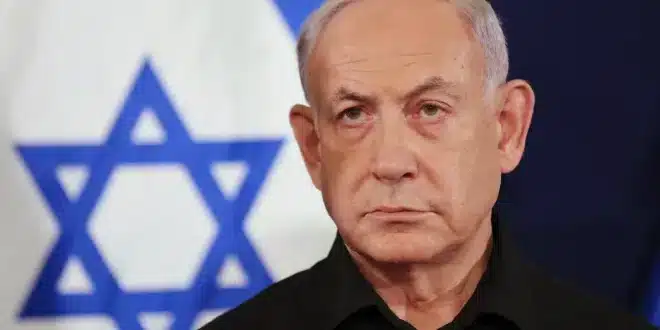The announcement that the International Criminal Court (ICC) is considering issuing an arrest warrant for Israeli Prime Minister Benjamin Netanyahu for war crimes and crimes against humanity has sparked intense debate about the court’s role as an independent adjudicator.
The request by Prosecutor Karim Khan to arrest the leader of a close U.S. ally comes as the United Nations’ International Court of Justice investigates whether Israel has committed genocide during its seven-month war against Hamas in Gaza.
Human rights activists generally welcomed Khan’s move on Monday, which also included arrest requests for Israel’s defense minister and three Hamas leaders. However, Netanyahu told ABC News that Khan’s decision has turned the ICC into a “pariah institution.”
In Washington, Senate Republicans have threatened sanctions against ICC staff, while Secretary of State Antony Blinken said the Hague-based court lacks jurisdiction and called the prosecutor’s actions “extremely wrongheaded” for equating Israeli officials with Hamas leaders.
Blinken said Tuesday that the Biden administration would work with Congress to formulate an appropriate response.
Khan has warned that attempts to interfere with the ICC’s work would violate its founding treaty, the Rome Statute. However, this warning may have limited impact, as major powers, including the U.S., Israel, China, and Russia, are not members of the court and do not recognize its jurisdiction.
European countries generally support the court. France and Belgium reaffirmed their backing following Monday’s announcement.
“France supports the International Criminal Court, its independence, and the fight against impunity in all situations,” the French foreign ministry stated, while Belgium’s foreign minister expressed similar support for the tribunal.
Some Palestinians criticized the perceived limited scope of Khan’s requests.
In an opinion piece on the Global Issues website, analyst Mouin Rabbani noted that Khan had ignored broader issues unrelated to the current Gaza situation.
Nour Odeh, a Palestinian political analyst in Ramallah, said she was not surprised that Khan also sought charges against Hamas leaders but found it cynical that he appeared to target Hamas more than Israel.
The ICC prosecutor’s office has been investigating alleged crimes in the Palestinian territories since 2014 and could seek additional arrest warrants in the future.
Khan’s announcement on Monday marked the first time in the ICC’s two-decade history that its prosecutor has sought to charge the leader of a major U.S. ally.
Israeli leaders deny committing any crimes, stating they are defending their nation and adhering to international law. Since Israel does not recognize the ICC’s jurisdiction, even if warrants are issued, Netanyahu and Defense Minister Yoav Gallant are unlikely to be arrested soon.
A decision on issuing warrants is expected within weeks, with the legal requirement being “reasonable grounds to believe” that the crimes outlined in Khan’s request were committed. Historically, ICC judges have generally approved such requests.
“This is a watershed event in the history of international justice,” human rights lawyer Reed Brody, who has pursued cases against leaders like Augusto Pinochet and Hissène Habré, said in an email. “The ICC has never, in over 21 years, indicted a Western official. Indeed, no international tribunal since Nuremberg has done so.”
The decision may have significant implications.
“The Court as an institution is overwhelmingly supported by Western governments, but that might not always be true in the future,” said Tom Ginsburg, a professor of international law at the University of Chicago Law School. “By charging the head of a Western-supported government along with a terrorist leader, the Court is making an appeal to even-handedness.”
Khan’s decision to consult a panel of top legal experts, including lawyer Amal Clooney, before seeking warrants highlights the sensitivity of the charges against Israeli and Hamas leaders.
“Clearly, the prosecutor wanted backing from prominent international lawyers for a highly charged decision,” Ginsburg said. “Including Amal Clooney ensures significant attention, and Theodore Meron, a former legal advisor to Israel’s Foreign Ministry and a prominent judge, helps counter charges of bias.”
The latest Gaza conflict began on October 7, when Hamas militants crossed into Israel, killing about 1,200 people, mostly civilians, and taking 250 hostages. Khan seeks warrants for Hamas leaders Yahya Sinwar, Mohammed Deif, and Ismail Haniyeh on charges including extermination, murder, and sexual violence.
Among the charges Khan aims to bring against Netanyahu and Gallant is the war crime of “starvation as a weapon of warfare,” marking a first in international courts.
“This is a watershed moment in addressing this egregious crime, which has long been viewed solely as a collateral or incidental effect of armed conflict, rather than a deliberate and calculated strategy,” said Catriona Murdoch of the rights group Global Rights Compliance.
For Palestinians who have long sought ICC action, Khan’s announcement is a breakthrough, even if it does not go far enough for some.
“Listening to Karim Khan talk about these crimes, these accusations, war crimes and crimes against humanity, knowing that this taboo has finally been broken, on an emotional level … it is historic. It’s monumental,” said Odeh.


